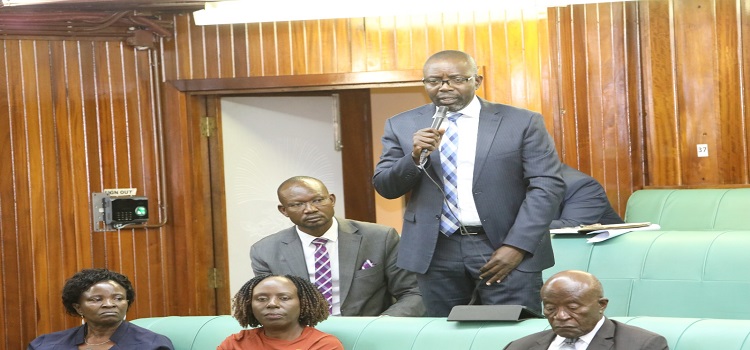Government Accounts Audit Exposes Systemic Failures and Financial Irregularities
The recently conducted audit of government accounts has exposed significant flaws in public sector payroll management and the implementation of the Parish Development Model (PDM), a flagship rural wealth-creation initiative. The Auditor General, John Muwanga, released the 2022/2023 annual report, shedding light on widespread financial irregularities across various government departments in a damning revelation.
Ghost Civil Servants and Financial Mismanagement
The audit brought to light a shocking discovery from last year’s manpower audit, where thousands of ghost civil servants were identified within the public payroll system. These phantom employees, potentially responsible for the disappearance of billions of shillings, raised concerns about the efficiency of payroll management in government.
During the report handover to Speaker Anita Among, Muwanga referred to the Ministry of Public Service’s May 2023 civil service staff validation exercise, revealing that 6,307 government employees were either confirmed dead, absconded, or retired during the validation. Out of these, 3,824 individuals were not promptly removed from the payroll, resulting in an irregular payment of Shs 23.62 billion after their exit date.
Further, Muwanga disclosed that 1,818 non-existent individuals, identified as ghost employees, were paid Shs 500 million in February 2023 alone. These payments could potentially lead to an annual financial loss of Shs 6.7 billion for the government.
Revolving Funds and Parish Development Model (PDM) Issues
The audit also shed light on the ineffective recovery of funds distributed through poverty eradication programs like the Youth Livelihood Programme (YLP) and the Uganda Women Entrepreneurship Programme (UWEP). Out of the Shs 237.03 billion recoverable, only Shs72 billion had been recovered by June 30, 2023, raising questions about the implementation and oversight of these programmes.
Additionally, the audit exposed flaws in the Parish Development Model, with ineligible beneficiaries and projects identified. In 68 local governments, 604 beneficiaries in 242 PDM Savings and Credit Cooperative Societies had implemented ineligible projects, potentially causing substantial losses of public funds.
Soaring Public Debt and Under-utilisation
In a troubling revelation, Muwanga reported that Uganda’s public debt had reached an unprecedented Shs 96.1 trillion as of June 2023. This represented a 10% increase from the previous year, with the debt growing at a higher rate than the Gross Domestic Product (GDP), raising concerns about the country’s ability to service the debt.
Furthermore, the government was found to have registered an under-utilisation of Shs 5.82 trillion, suggesting that there was no need for a supplementary budget. This under-utilisation was attributed to insufficient funds, cancelled invoices, unimplemented activities, and late releases, among other factors.
Challenges in Servicing the Debt
As the government struggles to service the outstanding debt, projections indicate that Shs 23.4 trillion will be dedicated to servicing part of Uganda’s soaring public debt in the current year. The Finance Ministry highlighted significant principal repayments on various projects, including Karuma Dam, Isimba Dam, Kabaale Airport, Afrexim budget support, Standard Bank of South Africa, and TDA/PTA budget support.
Call for Accountability and Scrutiny
In response to these alarming findings, Speaker Among urged the Leader of the Opposition, Mr. Joel Ssenyonyi, to expedite the scrutiny of the report. She emphasized the importance of timely scrutiny to prevent backlogs and called for a comprehensive audit of enterprises where the government holds shares to ensure transparency and fiscal responsibility.
The Auditor General’s report has ignited concerns about the overall financial management and accountability within the government. The revelations of ghost employees, mismanagement of funds, and soaring debt levels highlight the urgent need for comprehensive reforms and increased oversight. The House committees, including the Public Accounts Committee-Central, Public Accounts Committee-Local Government, and the Committee of Commissions Statutory Authorities and State Enterprises, are expected to play a crucial role in scrutinizing the findings and proposing recommendations for addressing the identified issues.




















